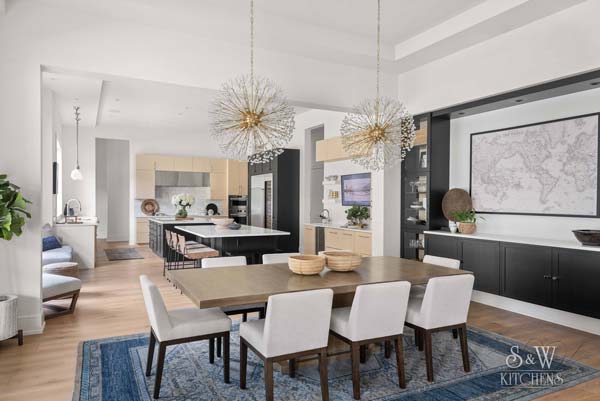You’ve made your house a home, but as time goes on, you start to realize flaws you might not have noticed on closing day — from the outdated appliances, to the lack of space, or even the costly fixes you hadn’t planned for. Issues such as these are common for many homeowners. So, to get you back to the home you once loved, we have listed a few ways your home may be holding you back and some effective solutions to turn your house back into the home you had been dreaming of.

1. It’s Costly
Problem:
A home is a large expense, but it can become even more costly when things like poor energy efficiency or constant repair costs are factored in. For some, your home may have already been outdated when you moved in. Fixtures, appliances, and structural elements were likely well past their lifespan— or atleast close to it. While the thought of purchasing an older home was once exciting, you’ve realized these repairs can cut into your budget tremendously. Luckily, there are ways to reduce the costs long-term and make the extra expense for improvements worth it.
Solution:
Getting your home inspected should be done prior to buying, but if you missed this step, set up a meeting with a certified home inspector ASAP. They will do a detailed inspection of the structural integrity of your home along with major appliances and heating systems. Once their inspection is complete, they will report on any issues or repairs that should be done. With a better understanding of what needs improving in your home, you can establish a budget that coincides with a prioritized list the inspector mentioned. Be sure to address the most timely issues like wall damage, weak ceiling structure, or unlevel flooring first.Then, move on to smaller, less pressing concerns as your budget allows. Take your time to research the best materials, keeping energy efficiency in mind, to ensure your home meets safety and efficiency standards.
2. It Isn’t Growing With You
Problem:
When new home buyers are on the hunt for the perfect home, they may forget to consider their future goals to grow and expand in several aspects of their lives. Then, before they know it, their home is bursting at the seams. You might not have your future mapped out on closing day, but it’s important to plan ahead or recognize when you have outgrown your home and it’s time to make a change.
Solution:
Begin by crafting a list of your future goals. This can include growing your family, planning for your teens’ transitions into college, or a possible career change. Once your list is complete, create a timeline for when these milestones may take place to help develop a corresponding budget. With your predetermined financial plans, you can begin to contribute to additional home improvements or a move altogether. These are large expenses, so factoring them into your goals can make them less daunting when the time comes to make a change. Be sure to refer to your goals list periodically to update when necessary. And most importantly, don’t rush the home improvements! Instead, space each project out to align with your lifestyle and create a home that will grow with you long-term through all of life’s seasons.

3. It Could Use Some Renovating
Problem:
You’ve bought a fixer-upper that shows some age, but you didn’t realize the costly updates that need to be made in order to make it safe and/or fitting to your needs. Renovations go hand-in-hand with owning a home. They help to keep up with changing trends and to keep your home dependable for years to come. Renovations are complicated, especially if not well planned for, but don’t worry, we have a few tips to help in the case your home needs some updating!
Solution:
To save money, start by addressing low-cost DIY cosmetic fixes that you can easily tackle. These may include adding a fresh coat of paint after patching a wall that needed some TLC or updating appliances and furniture. Doing projects yourself can help your budget while allowing your home to be a reflection of your style and creativity. If there are major improvements that need to be made, research contractors in your area to take on the large fixes like structural repairs or replacements. Work closely with their team to design your space and get an estimate prior to building so you can budget for the costs. Be sure to save for unexpected fixes that may arise as building progresses. If you can, utilize monetary support options like a home warranty to create more ease on your budget. This is a great opportunity to design the home of your dreams so take your time and take each project one step at a time.
4. It’s Affecting Decisions Outside of the Home
Problem:
Is your home affecting outside decisions like a career change or other opportunities that arise in your personal life? Well you’re not alone. The investment into a home can sometimes make you feel obligated to stay long-term. But, this doesn’t have to be the case.
Solution:
Deciding whether or not to relocate can be stressful, and when coupled with a new career, it can become overwhelming. Take time to review your options and answer these questions:
Will your new job allow your family to live more comfortably?
Will it ease financial stress?
Is it the right job for you?
Can you sell your home at a profitable price?
All of these can be answered with a bit of communication and planning. Contact your lender to sort through financial details if you are still paying towards a mortgage and inquire about an estimated selling price and if it will cover the expenses you will incur through the selling processes. Talk to your family as well, especially your partner, to gain their perspective on the matter and prevent the stress from tackling this decision on your own. If you are feeling stuck on where to begin, check out these other helpful tips about relocating to help make the decision a little easier.
